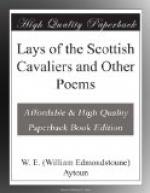After the battle of Philiphaugh, the royalist prisoners were butchered in cold blood, under the superintendence of a clerical emissary, who stood by rubbing his hands, and exclaiming—“The wark gangs bonnily on!” Were I to transcribe from the pamphlets before me the list of the murders which were perpetrated by the country people on the soldiery, officers, and gentlemen of loyal principles, during the reign of Charles II., I believe that no candid person would be surprised at the severe retaliation which was made. It must be remembered that the country was then under military law, and that the strongest orders had been issued by the Government to the officers in command of the troops, to use every means in their power for the effectual repression of the disturbances. The necessity of such orders will become apparent, when we reflect that, besides the open actions at Aird’s Moss and Drumclog, the city of Glasgow was attacked, and the royal forces compelled for a time to fall back upon Stirling.
Under such circumstances it is no wonder if the soldiery were severe in their reprisals. Innocent blood may no doubt have been shed, and in some cases even wantonly; for when rebellion has grown into civil war, and the ordinary course of the law is put in abeyance, it is always impossible to restrain military license. But it is most unfair to lay the whole odium of such acts upon those who were in command, and to dishonour the fair name of gentlemen, by attributing to them personally the commission of deeds of which they were absolutely ignorant. To this day the peasantry of the western districts of Scotland entertain the idea that Claverhouse was a sort of fiend in human shape, tall, muscular, and hideous in aspect, secured by infernal spells from the chance of perishing by any ordinary weapon, and mounted upon a huge black horse, the especial gift of Beelzebub! On this charger it is supposed that he could ride up precipices as easily as he could traverse the level ground—that he was constantly accompanied by a body of desperadoes, vulgarly known by such euphonious titles as “Hell’s Tam,” and “the De’il’s Jock,” and that his whole time was occupied, day and night,




